MYTHS AND MENDACITIES: THE ANCIENTS AND THE MODERNS
Tomislav Sunic
(The Occidental Quarterly, vol. 14, no. 4, Winter 2014–2015)
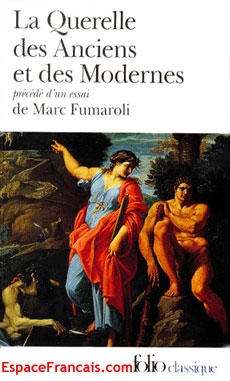 When discussing the myths of ancient Greece one must first define their meaning and locate their historical settings. The word “myth” has a specific meaning when one reads the ancient Greek tragedies or when one studies the theogony or cosmogony of the early Greeks. By contrast, the fashionable expression today such as “political mythology” is often laden with value judgments and derisory interpretations. Thus, a verbal construct such as “the myth of modernity” may be interpreted as an insult by proponents of modern liberalism. To a modern, self-proclaimed supporter of liberal democracy, enamored with his own system-supporting myths of permanent economic progress and the like, phrases, such as “the myth of economic progress” or “the myth of democracy,” may appear as egregious political insults.
When discussing the myths of ancient Greece one must first define their meaning and locate their historical settings. The word “myth” has a specific meaning when one reads the ancient Greek tragedies or when one studies the theogony or cosmogony of the early Greeks. By contrast, the fashionable expression today such as “political mythology” is often laden with value judgments and derisory interpretations. Thus, a verbal construct such as “the myth of modernity” may be interpreted as an insult by proponents of modern liberalism. To a modern, self-proclaimed supporter of liberal democracy, enamored with his own system-supporting myths of permanent economic progress and the like, phrases, such as “the myth of economic progress” or “the myth of democracy,” may appear as egregious political insults.
For many contemporaries, democracy is not just a doctrine that could be discussed; it is not a “fact” that experience could contradict; it is the truth of faith beyond any dispute. (1)
Criticizing, therefore, the myth of modern democracy may be often interpreted as a sign of pathological behavior. Given this modern liberal dispensation, how does one dare use such locutions as “the myth of modern democracy,” or “the myth of contemporary historiography,” or “the myth of progress” without being punished?
Ancient European myths, legends and folk tales are viewed by some scholars, including some Christian theologians, as gross re-enactments of European barbarism, superstition, and sexual promiscuity. (2) However, if a reader or a researcher immerses himself in the symbolism of the European myths, let alone attempts to decipher the allegorical meaning of the diverse creatures in those myths, such as, for instance, the scenes from the Orphic rituals, the hellhole of Tartarus, the carnage in the Iliad or in the Nibelungenlied, or the final divine battle in Ragnarök, then those mythical scenes take on a different, albeit often a self-serving meaning. (3) After all, in our modern so-called enlightened and freedom-loving liberal societies, citizens are also entangled in a profusion of bizarre infra-political myths, in a myriad of hagiographic tales, especially those dealing with World War II victimhoods, as well as countless trans-political legends which are often enforced under penalty of law. There-fore, understanding ancient and modern European myths and myth-makers, means, first and foremost, reading between the lines and strengthening one’s sense of the metaphor.
In hindsight when one studies the ancient Greek myths with their surreal settings and hyperreal creatures, few will accord them historical veracity or any empirical or scientific value. However, few will reject them as outright fabrications. Why is that? In fact, citizens in Europe and America, both young and old, still enjoy reading the ancient Greek myths because most of them are aware not only of their strong symbolic nature, but also of their didactic message. This is the main reason why those ancient European myths and sagas are still popular. Ancient European myths and legends thrive in timelessness; they are meant to go beyond any historical time frame; they defy any historicity. They are open to anybody’s “historical revisionism” or interpretation. This is why ancient European myths or sagas can never be dogmatic; they never re-quire the intervention of the thought police or a politically correct enforcer in order to make themselves readable or credible.
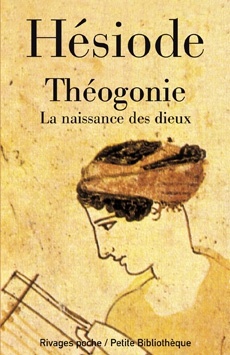 The prose of Homer or Hesiod is not just a part of the European cultural heritage, but could be interpreted also as a mirror of the pre-Christian European subconscious. In fact, one could describe ancient European myths as primal allegories where every stone, every creature, every god or demigod, let alone each monster, acts as a role model representing a symbol of good or evil. (4) Whether Hercules historically existed or not is beside the point. He still lives in our memory. When we were young and when we were reading Homer, who among us did not dream about making love to the goddess Aphrodite? Or at least make some furtive passes at Daphne? Apollo, a god with a sense of moderation and beauty was our hero, as was the pesky Titan Prometheus, al-ways trying to surpass himself with his boundless intellectual curiosity. Prometheus unbound is the prime symbol of White man’s irresistible drive toward the unknown and toward the truth irrespective of the name he carries in ancient sagas, modern novels, or political treatises. The English and the German poets of the early nineteenth century, the so -called Romanticists, frequently invoked the Greek gods and especially the Titan Prometheus. The expression “Romanticism” is probably not adequate for that literary time period in Europe because there was nothing romantic about that epoch or for that matter about the prose of authors such as Coleridge, Byron, or Schiller, who often referred to the ancient Greek deities:
The prose of Homer or Hesiod is not just a part of the European cultural heritage, but could be interpreted also as a mirror of the pre-Christian European subconscious. In fact, one could describe ancient European myths as primal allegories where every stone, every creature, every god or demigod, let alone each monster, acts as a role model representing a symbol of good or evil. (4) Whether Hercules historically existed or not is beside the point. He still lives in our memory. When we were young and when we were reading Homer, who among us did not dream about making love to the goddess Aphrodite? Or at least make some furtive passes at Daphne? Apollo, a god with a sense of moderation and beauty was our hero, as was the pesky Titan Prometheus, al-ways trying to surpass himself with his boundless intellectual curiosity. Prometheus unbound is the prime symbol of White man’s irresistible drive toward the unknown and toward the truth irrespective of the name he carries in ancient sagas, modern novels, or political treatises. The English and the German poets of the early nineteenth century, the so -called Romanticists, frequently invoked the Greek gods and especially the Titan Prometheus. The expression “Romanticism” is probably not adequate for that literary time period in Europe because there was nothing romantic about that epoch or for that matter about the prose of authors such as Coleridge, Byron, or Schiller, who often referred to the ancient Greek deities:
Whilst the smiling earth ye governed still,
And with rapture’s soft and guiding hand
Led the happy nations at your will,
Beauteous beings from the fable-land!
Whilst your blissful worship smiled around,
Ah! how different was it in that day!
When the people still thy temples crowned,
Venus Amathusia! (5)
Many English and German Romanticists were political realists and not daydreamers, as modern textbooks are trying to depict them. All of them had a fine foreboding of the coming dark ages. Most of them can be described as thinkers of the tragic, all the more as many of them end-ed their lives tragically. Many, who wanted to arrest the merciless flow of time, ended up using drugs. A poetic drug of choice among those “pagan” Romanticists in the early nineteenth-century Europe was opi-um and its derivative, the sleeping beauty laudanum. (6)
Myth and religion are not synonymous, although they are often used synonymously—depending again on the mood and political beliefs of the storyteller, the interpreter, or the word abuser. There is a difference between religion and myth—a difference, as stated above, depending more on the interpreter and less on the etymological differences between these two words. Some will persuasively argue that the miracles per-formed by Jesus Christ were a series of Levantine myths, a kind of Oriental hocus-pocus designed by an obscure Galilean drifter in order to fool the rootless, homeless, raceless, and multicultural masses in the dying days of Rome.(7)
Some of our Christian contemporaries will, of course, reject such statements. If such anti-Christian remarks were uttered loudly today in front of a large church congregation, or in front of devout Christians, it may lead to public rebuke.
In the modern liberal system, the expression “the religion of liberalism” can have a derisory effect, even if not intended. The word “religion” derives from the Latin word religare, which means to bind together or to tie together. In the same vein some modern writers and historians use the expression “the religion of the Holocaust” without necessarily assigning to the noun “religion” a pejorative or abusive meaning and without wishing to denigrate Jews. (8)
However, the expression “the religion of the Holocaust” definitely raises eyebrows among the scribes of the modern liberal system given that the memory of the Holocaust is not meant to enter the realm of religious or mythical transcendence, but instead remain in the realm of secular, rational belief. It must be viewed as an undisputed historical fact. The memory of the Holocaust, however, has ironically acquired quasi-transcendental features going well beyond a simple historical narrative. It has become a didactic message stretching well beyond a given historical time period or a given people or civilization, thus escaping any time frame and any scientific measurement. The notion of its “uniqueness” seems to be the trait of all monotheistic religions which are hardly in need of historical proof, let alone of forensic or material documentation in order to assert themselves as universally credible.
The ancestors of modern Europeans, the ancient polytheist Greeks, were never tempted to export their gods or myths to distant foreign peoples. By contrast, Judeo -Christianity and Islam have a universal message, just like their secular modalities, liberalism and communism. Failure to accept these Islamic or Christian beliefs or, for that matter, deriding the modern secular myths embedded today in the liberal system, may result in the persecution or banishment of modern heretics, often under the legal verbiage of protecting “human rights” or “protecting the memory of the dead,” or “fighting against intolerance.” (9).
There is, however, a difference between “myth” and “religion,” although these words are often used synonymously. Each religion is history-bound; it has a historical beginning and it contains the projection of its goals into a distant future. After all, we all measure the flow of time from the real or the alleged birth of Jesus Christ. We no longer measure the flow of time from the fall of Troy, ab urbem condita, as our Roman ancestors did. The same Christian frame of time measurement is true not just for the Catholic Vatican today, or the Christian-inspired, yet very secular European Union, but also for an overtly atheist state such as North Korea. So do Muslims count their time differently—since the Hegira (i.e., the flight of Muhammad from Mecca), and they still spiritually dwell in the fifth century, despite the fact that most states where Muslims form a majority use modern Western calendars. We can observe that all religions, including the secular ones, unlike myths, are located in a historical time frame, with well-marked beginnings and with clear projections of historical end-times.
On a secular level, for contemporary dedicated liberals, the true un-disputed “religion” (which they, of course, never call “religion”) started in 1776, with the day of the American Declaration of Independence, whereas the Bolsheviks began enforcing their “religion” in 1917. For all of them, all historical events prior to those fateful years are considered symbols of “the dark ages.”
What myth and religion do have in common, however, is that they both rest on powerful symbolism, on allegories, on proverbs, on rituals, on initiating labors, such as the ones the mythical Hercules endured, or the riddles Jason had to solve with his Argonauts in his search for the Golden Fleece. (10) In a similar manner, the modern ideology of liberalism, having become a quasi-secular religion, consists also of a whole set and subsets of myths where modern heroes and anti-heroes appear to be quite active. Undoubtedly, modern liberals sternly reject expressions such as “the liberal religion,” “the liberal myth,” or “the liberal cult.” By contrast, they readily resort to the expressions such as “the fascist myth” or “the communist myth,” or “the Islamo-fascist myth” whenever they wish to denigrate or criminalize their political opponents. The modern liberal system possesses also its own canons and its own sets of rituals and incantations that need to be observed by contemporary believers— particularly when it comes to the removal of political heretics.
Myths are generally held to be able to thrive in primitive societies only. Yet based on the above descriptions, this is not always the case. Ancient Greece had a fully developed language of mythology, yet on the spiritual and scientific level it was a rather advanced society. Ancient Greek mythology had little in common with the mythology of today’s Polynesia whose inhabitants also cherish their own myths, but whose level of philosophical or scientific inquiry is not on a par with that of the ancient Greeks.
 Did Socrates or Plato or Aristotle believe in the existence of harpies, Cyclops, Giants, or Titans? Did they believe in their gods or were their gods only the personified projects of their rituals? Very likely they did believe in their gods, but not in the way we think they did. Some modern scholars of the ancient Greek mythology support this thesis: “The dominant modern view is the exact opposite. For modern ritualists and indeed for most students of Greek religion in the late nineteenth and throughout the twentieth century, rituals are social agendas that are in conception and origin prior to the gods, who are regarded as mere human constructs that have no reality outside the religious belief system that created them.” (11).
Did Socrates or Plato or Aristotle believe in the existence of harpies, Cyclops, Giants, or Titans? Did they believe in their gods or were their gods only the personified projects of their rituals? Very likely they did believe in their gods, but not in the way we think they did. Some modern scholars of the ancient Greek mythology support this thesis: “The dominant modern view is the exact opposite. For modern ritualists and indeed for most students of Greek religion in the late nineteenth and throughout the twentieth century, rituals are social agendas that are in conception and origin prior to the gods, who are regarded as mere human constructs that have no reality outside the religious belief system that created them.” (11).
One can argue that the symbolism in the myths of ancient Greece had an entirely different significance for the ancient Greeks than it does for our contemporaries. The main reason lies in the desperate effort of the moderns to rationally explain away the mythical world of their ancestors by using rationalist concepts and symbols. Such an ultrarational drive for the comprehension of the distant and the unknown is largely due to the unilinear, monotheist mindset inherited from Judaism and from its offshoot Christianity and later on from the Enlightenment. In the same vein, the widespread modern political belief in progress, as Georges Sorel wrote a century ago, can also be observed as a secularization of the biblical paradise myth. “The theory of progress was adopted as a dogma at the time when the bourgeoisie was the conquering class; thus one must see it as a bourgeois doctrine.” (12)
The Western liberal system sincerely believes in the myth of perpetual progress. Or to put it somewhat crudely, its disciples argue that the purchasing power of citizens must grow indefinitely. Such a linear and optimistic mindset, directly inherited from the Enlightenment, prevents modern citizens in the European Union and America from gaining a full insight into the mental world of their ancestors, thereby depriving them of the ability to conceive of other social and political realities. Undoubtedly, White Americans and Europeans have been considerably affected by the monotheistic mindset of Judaism and its less dogmatic offshoot, Christianity, to the extent that they have now considerable difficulties in conceptualizing other truths and other levels of knowledge.
It needs to be stressed, though, that ancient European myths have a strong component of the tragic bordering on outright nihilism. Due to the onslaught of the modern myth of progress, the quasi-inborn sense of the tragic, which was until recently a unique character trait of the White European heritage, has fallen into oblivion. In the modern liberal system the notion of the tragic is often viewed as a social aberration among individuals professing skepticism or voicing pessimism about the future of the modern liberal system. Nothing remains static in the notion of the tragic. The sheer exuberance of a hero can lead a moment later to his catastrophe. The tragic trait is most visible in the legendary Sophocles’ tragedy Oedipus at Colonus when Oedipus realizes that he is doomed forever for having unknowingly killed his father and for having un-knowingly had an incestuous relationship with his mother. Yet he struggles in vain to the very end in order to escape his destiny. Here is the often quoted line Nr. 1225, i.e., the refrain of the Chorus:
Not to be born is past all prizing best; but when a man has seen the light this is next best by far, that with all speed he should go thither whence he has come. (13)
The tragic consists in the fact that insofar as one strives to avoid a catastrophe, one actually brings a catastrophe upon himself. Such a tragic state of mind is largely rejected by the proponents of the liberal myth of progress.

MYTHS AND THE TRAGIC: THE COMING OF THE TITANIC AGE
Without myths there is no tragic, just like without the Titans there can be no Gods. It was the twelve Titans who gave birth to the Gods and not the other way around. It was the titanesque Kronos who gave birth to Zeus, and then, after being dethroned by his son Zeus, forced to dwell with his fellow Titans in the underworld. But one cannot rule out that the resurrection of the head Titan Kronos, along with the other Titans, may reoccur again, perhaps tomorrow, or perhaps in an upcoming eon, thus enabling the recommencement of the new titanic age. After all Prometheus was himself a Titan, although, as a dissident Titan, he had decided to be on the side of the Gods and combat his own fellow Titans. Here is how Friedrich Georg Jünger, an avid student of the ancient Greek myths and the younger brother of the famous contemporary essayist Ernst Jünger, sees it:
Neither are the Titans unrestrained power-hungry beings, nor do they scorn the law; rather, they are the rulers over a legal system whose necessity must never be put into doubt. In an awe -inspiring fashion, it is the flux of primordial elements over which they rule, holding bridle and reins in their hands, as seen in Helios. They are the guardians, custodians, supervisors, and the guides of order. They are the founders unfolding beyond chaos, as pointed out by Homer in his remarks about Atlas who shoulders the long columns holding the heavens and the Earth. Their rule rules out any confusion, any disorderly power performance. Rather, they constitute a powerful deterrent against chaos. (14)

Nothing remains new for the locked-up Titans: they know every-thing. They are the central feature in the cosmic eternal return. The Titans are not the creators of chaos, although they reside closer to chaos and are, therefore, better than the Gods—more aware of possible chaotic times. They can be called telluric deities, and it remains to be seen whether in the near future they may side up with some chthonic monsters, such as those described by the novelist H. P. Lovecraft.
It seems that the Titans are the necessary element in the cosmic balance, although they have not received due acknowledgment by contemporary students of ancient and modern mythologies. The Titans are the central feature in the study of the will to power and each White man who demonstrates this will has a good ingredient of the Titanic spirit:
What is Titanic about man? The Titanic trait occurs everywhere and it can be described in many ways. Titanic is a man who completely relies only upon himself and has boundless confidence in his own powers. This confidence absolves him, but at the same time it isolates him in a Promethean mode. It gives him a feeling of independence, albeit not devoid of arrogance, violence, and defiance. (15)
Today, in our disenchanted world, from which all gods have departed, the resurgence of the Titans may be an option for a dying Western civilization. The Titans and the titanic humans are known to be out-spoken about their supreme independence, their aversion to cutting deals, and their uncompromising, impenitent attitude. What they need in addition is a good portion of luck, or fortuna.
Notes:
1. Louis Rougier, La mystique démocratique (Paris: Albatros, 1983), p. 13.
2. Nicole Belmont, Paroles païennes: mythe et folklore (Paris: Imago, 1986) quotes on page 106 the German-born English Orientalist and philologist Max Müller who sees in ancient myths “a disease of language,” an approach criticized by the anthropological school of thought. His critic Andrew Lang writes: “The general problem is this: Has language—especially language in a state of ‘disease,’ been the great source of the mythology of the world? Or does mythology, on the whole, represent the survival of an old stage of thought—not caused by language—from which civilised men have slowly emancipated themselves? Mr. Max Müller is of the former, anthropologists are of the latter, opinion.” Cf. Andrew Lang, Modern Mythology (New York: Longmans, Green, and Co., 1897), p.x.
3. Thomas Bullfinch, The Golden Age of Myth and Legend (London: Wordsworth Editions, 1993).
4.See the German classicist, Walter F. Otto, The Homeric Gods: The Spiritual Significance of Greek Religion, trans. Moses Hadas (North Stratford, NH: Ayer Company Publishers, 2001). Otto is quite critical of Christian epistemology. Some excerpts from this work appeared in French translation also in his article, “Les Grecs et leurs dieux,” in the quarterly Krisis (Paris), no. 23 (January 2000).
5. Friedrich Schiller, The Gods of Greece, trans. E. A. Bowring. ttp://www.bartleby.com/270/9/2.html
6. Tomislav Sunic, “The Right Stuff,” Chronicles (October 1996), 21–22; Tomislav Sunic, “The Party Is Over,” The Occidental Observer (November 5, 2009). http://www.theoccidentalobserver.net/authors/Sunic-Drugs.html
7.Tomislav Sunic, “Marx, Moses, and the Pagans in the Secular City,” CLIO: A Journal of Literature, History, and the Philosophy of History 24, no. 2 (Winter 1995).
8.Gilad Atzmon, The Wandering Who? A Study of Jewish Identity Politics (Winchester, UK: Zero Books, 2011), 148–49.
9. Alain de Benoist, “Die Methoden der Neuen Inquisition,” in Schöne vernetzte Welt (Tübingen: Hohenrain Verlag, 2001), p. 190–205.
10. Michael Grant, Myths of the Greeks and Romans (London: Phoenix, 1989), p. 289–303.
11. Albert Henrichs, “What Is a Greek God?,” in The Gods of Ancient Greece, ed. Jan Bremmer and Andrew Erskine (Edinburgh: Edinburgh University Press, 2010), p- 26.
12. Georges Sorel, Les Illusions du progrès (Paris: Marcel Rivière, 1911), p. 5–6.
13. Sophocles, Oedipus at Colonus, in The Complete Plays of Sophocles, ed. and trans. R. C. Jebb (New York: Bantam Books, 1979), p. 250.
14. Friedrich Georg Jünger, Die Titanen (Frankfurt: Klostermann, 1944), p. 89–90.
15. Ibid., 105.





 del.icio.us
del.icio.us
 Digg
Digg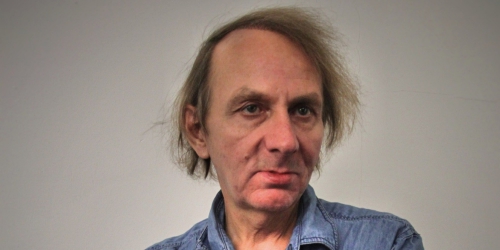
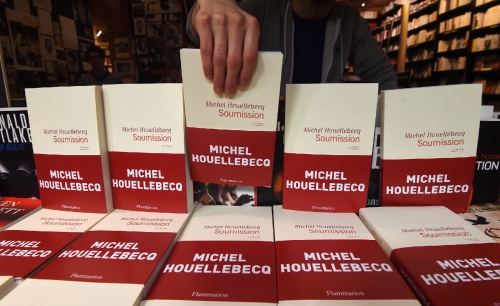
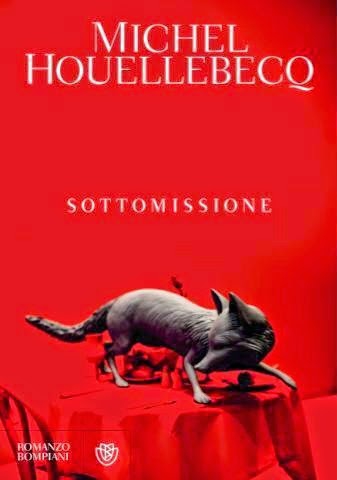 This kind of argument, even if it is part of a dialectic, can only be very troubling for Identitarians, who incidentally are portrayed in the book as wanting “Race war now!” while we are still the overwhelming majority in mother Europa. This is not an irrational attitude if a war must occur: there is no question that we grow demographically weaker with every generation in the face of the fatal triad of sub-replacement fertility, displacement-level immigration, and miscegenation.
This kind of argument, even if it is part of a dialectic, can only be very troubling for Identitarians, who incidentally are portrayed in the book as wanting “Race war now!” while we are still the overwhelming majority in mother Europa. This is not an irrational attitude if a war must occur: there is no question that we grow demographically weaker with every generation in the face of the fatal triad of sub-replacement fertility, displacement-level immigration, and miscegenation.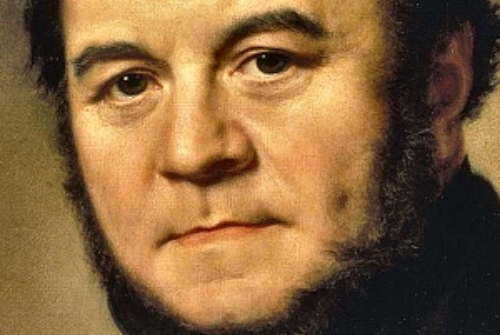
 Collaborateur régulier aux sites dissidents Europe Maxima, Euro-Synergies et Synthèse nationale, Claude Bourrinet est un penseur impertinent. C’est aussi un remarquable biographe. Vient de paraître sous sa signature un excellent Stendhal dans la collection « Qui suis-je ? ».
Collaborateur régulier aux sites dissidents Europe Maxima, Euro-Synergies et Synthèse nationale, Claude Bourrinet est un penseur impertinent. C’est aussi un remarquable biographe. Vient de paraître sous sa signature un excellent Stendhal dans la collection « Qui suis-je ? ».

 When discussing the myths of ancient Greece one must first define their meaning and locate their historical settings. The word “myth” has a specific meaning when one reads the ancient Greek tragedies or when one studies the theogony or cosmogony of the early Greeks. By contrast, the fashionable expression today such as “political mythology” is often laden with value judgments and derisory interpretations. Thus, a verbal construct such as “the myth of modernity” may be interpreted as an insult by proponents of modern liberalism. To a modern, self-proclaimed supporter of liberal democracy, enamored with his own system-supporting myths of permanent economic progress and the like, phrases, such as “the myth of economic progress” or “the myth of democracy,” may appear as egregious political insults.
When discussing the myths of ancient Greece one must first define their meaning and locate their historical settings. The word “myth” has a specific meaning when one reads the ancient Greek tragedies or when one studies the theogony or cosmogony of the early Greeks. By contrast, the fashionable expression today such as “political mythology” is often laden with value judgments and derisory interpretations. Thus, a verbal construct such as “the myth of modernity” may be interpreted as an insult by proponents of modern liberalism. To a modern, self-proclaimed supporter of liberal democracy, enamored with his own system-supporting myths of permanent economic progress and the like, phrases, such as “the myth of economic progress” or “the myth of democracy,” may appear as egregious political insults. The prose of Homer or Hesiod is not just a part of the European cultural heritage, but could be interpreted also as a mirror of the pre-Christian European subconscious. In fact, one could describe ancient European myths as primal allegories where every stone, every creature, every god or demigod, let alone each monster, acts as a role model representing a symbol of good or evil. (4) Whether Hercules historically existed or not is beside the point. He still lives in our memory. When we were young and when we were reading Homer, who among us did not dream about making love to the goddess Aphrodite? Or at least make some furtive passes at Daphne? Apollo, a god with a sense of moderation and beauty was our hero, as was the pesky Titan Prometheus, al-ways trying to surpass himself with his boundless intellectual curiosity. Prometheus unbound is the prime symbol of White man’s irresistible drive toward the unknown and toward the truth irrespective of the name he carries in ancient sagas, modern novels, or political treatises. The English and the German poets of the early nineteenth century, the so -called Romanticists, frequently invoked the Greek gods and especially the Titan Prometheus. The expression “Romanticism” is probably not adequate for that literary time period in Europe because there was nothing romantic about that epoch or for that matter about the prose of authors such as Coleridge, Byron, or Schiller, who often referred to the ancient Greek deities:
The prose of Homer or Hesiod is not just a part of the European cultural heritage, but could be interpreted also as a mirror of the pre-Christian European subconscious. In fact, one could describe ancient European myths as primal allegories where every stone, every creature, every god or demigod, let alone each monster, acts as a role model representing a symbol of good or evil. (4) Whether Hercules historically existed or not is beside the point. He still lives in our memory. When we were young and when we were reading Homer, who among us did not dream about making love to the goddess Aphrodite? Or at least make some furtive passes at Daphne? Apollo, a god with a sense of moderation and beauty was our hero, as was the pesky Titan Prometheus, al-ways trying to surpass himself with his boundless intellectual curiosity. Prometheus unbound is the prime symbol of White man’s irresistible drive toward the unknown and toward the truth irrespective of the name he carries in ancient sagas, modern novels, or political treatises. The English and the German poets of the early nineteenth century, the so -called Romanticists, frequently invoked the Greek gods and especially the Titan Prometheus. The expression “Romanticism” is probably not adequate for that literary time period in Europe because there was nothing romantic about that epoch or for that matter about the prose of authors such as Coleridge, Byron, or Schiller, who often referred to the ancient Greek deities: Did Socrates or Plato or Aristotle believe in the existence of harpies, Cyclops, Giants, or Titans? Did they believe in their gods or were their gods only the personified projects of their rituals? Very likely they did believe in their gods, but not in the way we think they did. Some modern scholars of the ancient Greek mythology support this thesis: “The dominant modern view is the exact opposite. For modern ritualists and indeed for most students of Greek religion in the late nineteenth and throughout the twentieth century, rituals are social agendas that are in conception and origin prior to the gods, who are regarded as mere human constructs that have no reality outside the religious belief system that created them.” (11).
Did Socrates or Plato or Aristotle believe in the existence of harpies, Cyclops, Giants, or Titans? Did they believe in their gods or were their gods only the personified projects of their rituals? Very likely they did believe in their gods, but not in the way we think they did. Some modern scholars of the ancient Greek mythology support this thesis: “The dominant modern view is the exact opposite. For modern ritualists and indeed for most students of Greek religion in the late nineteenth and throughout the twentieth century, rituals are social agendas that are in conception and origin prior to the gods, who are regarded as mere human constructs that have no reality outside the religious belief system that created them.” (11).

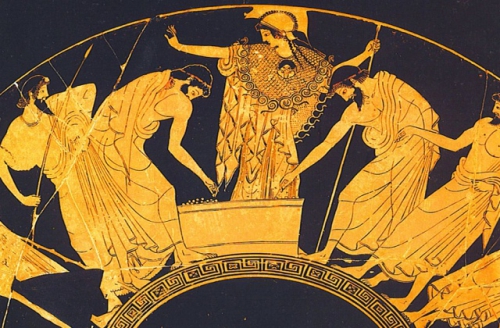
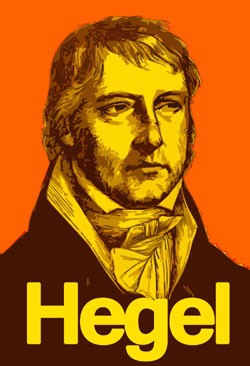 G. W. F. Hegel and his able interpreter Alexandre Kojève claim that the essence of consciousness is “negativity,” that man lives “outside himself,” that man “negates” or “nihilates” nature, that man is a “nothingness” or a “hole in being,” that man is “time that negates space.” What does this mean?
G. W. F. Hegel and his able interpreter Alexandre Kojève claim that the essence of consciousness is “negativity,” that man lives “outside himself,” that man “negates” or “nihilates” nature, that man is a “nothingness” or a “hole in being,” that man is “time that negates space.” What does this mean?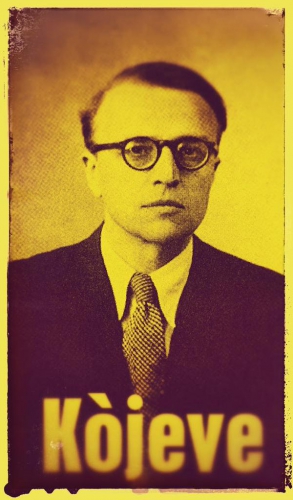 Next, let’s consider the ideas of “negating” and “nihilating” nature. When a plant or an animal finds something from the external world that fulfills its needs, it must remove that thing from the outside world and transform and incorporate it into itself. Hegel and Kojève refer to this activity as “negating,” i.e., saying “no.”
Next, let’s consider the ideas of “negating” and “nihilating” nature. When a plant or an animal finds something from the external world that fulfills its needs, it must remove that thing from the outside world and transform and incorporate it into itself. Hegel and Kojève refer to this activity as “negating,” i.e., saying “no.”